Fan Review Central
Real Takes, Bold Voices — See What the People Think
Top Picks Right Now
The Films Fans Are Buzzing About This Week
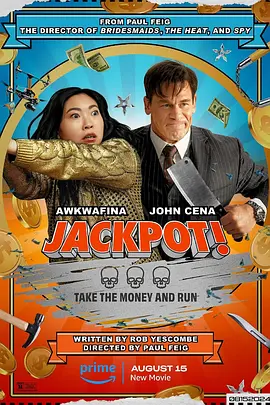
Jackpot!
Director: Comedy, Action
Cast: John Cena, Awkwafina, Simu Liu, Seann William Scott, Michael Hitchcock, More...
Set in the near future, the economically challenged state of California has created a lottery rule: you need to kill the winner before sunset to legally claim their prize. Katie (Awkwafina), who has just moved to Los Angeles, unexpectedly finds out that she has won the lottery. She must team up with amateur jackpot protector Noel (Cena) to ensure that she survives until sunset to claim the multi-billion dollar reward. At the same time, Noel's rival and fellow protector Louis (Simu Liu) also wants to escort Katie all the way to sunset to earn a generous commission.
Read Full Review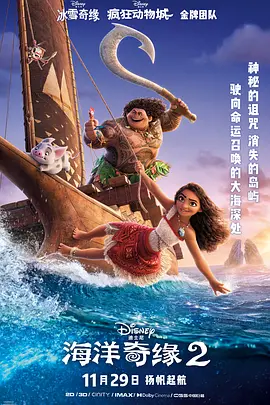
Moana 2
Under the sudden call of the ancestral spirits, Moana (voiced by Auli'i Cravalho), Maui (voiced by Dwayne Johnson) and the new crew will set out to the other end of Oceania, going deep into dangerous and unknown waters, facing a new adventure they have never seen before.
Read Full Review
A Complete Unknown
The film is set in the New York music scene in the early 1960s, recreating the beginning and end of Bob Dylan's electric guitar controversy. At the age of 19, Bob Dylan (Timothée Chalamet) came to New York's West Village from Minnesota with his guitar on his back. His folk songs were appreciated by his idols and favored by music fans. Bob, who was originally unknown, quickly became a hot new star in the New York folk music scene. At the Newport Folk Festival in 1965, Bob Dylan used an electric guitar on stage for the first time, which not only subverted the definition of folk music, but also rewrote the future of American music. This film is adapted from the documentary "Dylan Goes Electric" written by Elijah Wald.
Read Full ReviewBrowse All Reviews
Full Range of Fan Favorites — Every Opinion, Every Genre

Jackpot!
Director: Comedy, Action
Cast: John Cena, Awkwafina, Simu Liu, Seann William Scott, Michael Hitchcock, More...
User Rating: 5.8/10 (4111 votes)
Even though I am a fan of Zhao Xina, I have to say that this movie is just average, barely passable. The black is not black enough, the comedy is not comedy enough, even the end credits are very average. It is purely a ridiculous action movie under the name of comedy. There is no fun, no exciting fighting and action scenes, and the doubles are visibly exposed many times. The heroine is always playing dumb, with a tangled brow, acting ugly and weird, and the golden costume is embarrassing. And she foolishly avoids the pursuit of the whole city without changing clothes, so dazzling. She doesn't know how to use a wig, hat and sunglasses to cover up, and there is a mask behind, but she took it off. When I saw the street puppets, I thought she could find a puppet costume to hide in, but she didn't. I really don't know why she always gets roles. Her voice acting in cartoons before was very recognizable, and I knew it was her as soon as I heard her voice. As soon as Liu Simu showed up in the commercial, I knew he would be the villain. The gold Rolex watch is nice, it seems to be a Daytona. I don't know what brand Zhao Xina is wearing, there is a close-up of the dial, but I don't recognize it. Judging from his character in the film, it should not be as expensive as a Rolex. The watch chain also looks like a Rolex. If he continues to act in films like this, his acting career will be ruined, which means that he and his management team don't know how to choose scripts. It's worrying. I have been a fan of him since the Self-Stop Squad. He is definitely the successor to the governor, and he has some more advantages. It's a pity that I didn't meet a good production team, a good script, a good role, and a good director. None of them can be missing. The governor had a good eye back then and was good at choosing films to shoot. That rock star is handsome! His clothes are nice and his home is tasteful, but can't the safe house be controlled from inside and locked and the password changed? And then they left him outside the house knowing that the password might be leaked. If it wasn't arranged in this way, the drama could have ended abruptly. So the script is very bad, and the incident of mobile phones being attacked was vividly demonstrated by Lebanon these days, proving that the plot of the movie is not purely fabricated. Ha ha ha ha. Liu Simu was furious. It was incomprehensible that the landlord had a good ending. And the black old man didn't get any material rewards, which was also... The director is completely brain dead. The main plot of the film is...
Read Full Review
Moana 2
Director: Comedy, Animation, Musical, Fantasy
Cast: Aulii Cravalho, Dwayne Johnson, alalai Chong, Rose Matafeo, David Fahn, More ...
User Rating: 6.6/10 (33322 votes)
The quality of Disney's animation works in recent years is really worrying. The story routine is directly worn as a coat, and the body is also skinny. Every time they make animations, they are free to follow the formula. Encountering difficulties + marching forward + retreating after setbacks + spiritual growth + overcoming difficulties + super happy ending = "Moana 2". This film is even more sloppy and hasty. The main characters have a clear division of labor and lack novelty. The villains have no sense of oppression, and they are just here to play a supporting role, with very little face time. The growth of the protagonist is exactly the same as the first one. Last time, Moana helped Maui untie his knot, and this time, Maui helped Moana achieve sublimation. Both of them drank a sip of chicken soup, but in the final analysis, it is still the same bowl of soup. The only bright spots are the supporting animals, which can make people laugh accidentally, but it's just a laugh, and this is the style of Disney animation. If not, the watchability will be greatly reduced. Comparing "Inside Out" and "Oceans", Pixar is more stable, thoughtful and progressive, while Disney is conservative and will only ruin its reputation. Just listen to the movie songs.
Read Full Review
A Complete Unknown
Director: Drama, Music, Biography
Cast: Timothée Chalamet, Edward Norton, Elle Fanning, Monica Barbaro, Boyd Holbrook, More...
User Rating: 6.5/10 (12791 votes)
Although the film is adapted from Elijah Wald's "Dylan Goes Electric!" and the narrative is based on Dylan's groundbreaking (actually farcical) electric performance at the 1965 Newport Folk Festival, as a Dylan fan, what touched me most after watching "A Complete Unknown" was Sylvie Russo - yes, this is a pseudonym in the film, and she is actually Dylan's early muse, Suze Rotolo, the beautiful and playful girl on the cover of the great The Freewheelin' Bob Dylan. Rock fans are familiar with the story of Suze Rotolo, including her autobiography "The Time of Letting Go", which was translated into Chinese by Chen Zhen many years ago, and Dylan's description in "Chronicles", which together outline the time that young Dylan spent in Greenwich Village, New York. Although the role of Suze was adjusted in "A Complete Unknown", such as Suze never participating in the Newport in 1965, not to mention the plot of their farewell across the iron fence, including the ambiguous description of Dylan and Suze's breakup in the movie (an important point is that Suze was pregnant with Dylan's child, and they eventually decided to abort together, which was an inevitable link in the collapse of their relationship), these adaptations in the movie partially protected Suze, and also protected Dylan, who is still alive this year at the age of 83, and Joan Baez, who is 84 years old. On the other hand, these adaptations are quite successful in my opinion, and they supplement (actually confirm) my conception of the young Dylan at that time as a Dylan fan. There were three scenes, three times when Dylan sang, and Sylvie Russo (let’s keep calling her by that name) in the audience touched me: The first time was when Dylan sang "A Hard Rain's A-Gonna Fall." At this time, Dylan was already a rising folk star, and when he was recognized by fans, he quickly got into the car (a tribute to the Beatles' hard day life?). Sylvie, who appeared on the cover and was probably the happiest girl in Greenwich Village in the eyes of the outside world, was in the audience. She swallowed her saliva and then showed a relieved but bitter smile - at this moment, Sylvie knew that Dylan no longer belonged to him. This was the first time I cried in the movie. The second time, in Newport, Dylan sang The Times They Are A-Changin, with guitar, harmonica, hoarse voice, and the fans singing in chorus. This was the strong sound of the American era in the 1960s, and it was also the sound field that Dylan wanted to break away from later. At this time, the camera was given to Sylvie again. At this moment, she already knew that Dylan had created "the Dylan in everyone's mind". She knew Dylan's true character and knew that Dylan would definitely break this. Even Joan Baez in the backstage showed a meaningful expression: This bastard will not stop for anyone, including himself. The last time, yes, is the climax of the film, It Ain't Me Babe. In the film, Dylan and Joan Baez seem to be singing this song sweetly, But it ain't me, babe, No, no, no, it ain't me, babe, on stage like a couple, flirting, constantly denying and affirming each other - in fact, in the real world, Dylan and Joan sang this song in 1964, and in the film, it was a transplant in 1965, and the relationship between Dylan and Joan was also tangled. I like this part very much. Sylvie knew before the song was finished that Dylan was a complete jerk. Don't hold on to your illusions, let's go, don't be blinded by his talent. Although many viewers will think this is a love scene, in my opinion, Sylvie is the earliest prophet. She predicted the greatest chameleon in the history of pop music, who would use one sincere lie after another to ruthlessly betray herself again and again. Finally, what Sylvie said, "He has a lot of people to talk to," which confirms Dylan's famous saying, "For me, it's harder to sing to 50 people than to 20,000 people." After watching the film, columnist Darryn King thought that Elle Fanning 's interpretation of Sylvie was not good (shit), but he still wrote in his Forbes article that Rotolo left "a wrenching record of the emotional costs of fame (from the perspective of a victim) and, of course, a penetrating portrait of Dylan's transformation from folk-singing jerk to, well, jerk and global icon." You're right, Dylan is a complete asshole. However, in the movie "Nobody", the director chose to use a simple and understandable emotional line to replace Dylan's reason for tearing off the label of being the flag bearer, and finally leading to the film. Although this adaptation seems to be dramatic, for Dylan's fans, as I said before, it is reasonable. Anyway, there is nothing we don't know about Dylan's little things. As for those viewers who are not familiar with Dylan, they may find it inexplicable, what is so interesting about the story of a scumbag, etc. This can only be a choice. Anyway, Dylan's catchphrase is, it's none of my business, I'm not there.
Read Full Review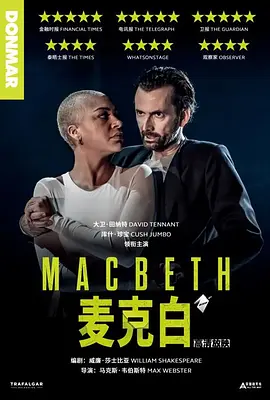
Macbeth
Director: Drama
Cast: David Tennant, Cush Jumbo, Moyo Akande, Annie Grace, Kaspar Nove, More...
User Rating: 7.7/10 (642 votes)
The short review says that Titi adds one star, the child adds one star, and the glass slapping adds one star. Then a friend who feels the same pointed out that the original play is only worth one star. Haha. Indeed. I was quite upset after watching it at that time. Although I had enough time to change the train from the last train to half an hour earlier because it was less than nine o'clock at the end, I still couldn't say its advantages. A few days after watching it, I was no longer as excited (unhappy) as I was at that time. I recorded it calmly. In two days, I really forgot everything. The dividing line of the full spoiler is to talk about the advantages first. Yes, this version also has advantages~ 1. Big Titi. Titi acted too well. Although the director and the actors on the same stage created many difficulties, she burst into light when she had the opportunity. For this reason, I will definitely recommend this version. The most impressive place is also one of the few places in this version of the play that makes people feel the connection between Macbeth and his wife. I think it was completely made up by Titi: the monologue after the servant reported the death of Lady Macbeth and Macbeth said, "She's dead, she's dead sooner or later." In other versions, this part usually only expresses Macbeth's indifference to human nature and his helplessness towards life and death at this point in the story, but Titti gave it a particularly fragile and melancholy tone, which makes people feel Macbeth's deep loneliness and helplessness after Lady Macbeth's death. It's like a eulogy for Lady Macbeth, which is an emotion I have never experienced before. Their connection is much deeper than I imagined. 2. There is a wonderful arrangement. At the banquet after Banquo's death, because the script directly wrote Banquo's ghost, basically every version also has a real ghost. But this version didn't have a person. In other words, most of what we saw before was from Macbeth's perspective, but this version gives us Lady Macbeth's perspective, the guest's perspective. This made me feel a sense of sudden realization, and I very intuitively experienced the dislocation between Macbeth and his wife, that is, Macbeth saw Banquo, and Lady Macbeth thought he saw Duncan. You can even imagine Macbeth seeing Banquo and Duncan, and imagine Lady Macbeth gradually realizing that he had killed Banquo, which gave a lot of space. 3. The child who played all the children is very good, and the future is promising. 4. The stage design is quite good. The overall structure is a square white stage in the center, island-shaped, surrounded by audience seats on three sides, with a glass on the back. The ground behind the glass is still flush with the stage. It can be considered that the area behind the glass is also part of the stage. There are several scenes where characters hit the glass in the back, which is super scary. Lady Macbeth also hit the glass when she was carried away from the back after sleepwalking, which was particularly desperate. The music is also very good! So that's all the advantages. The annoying things about this version: 1. Cutting the bones. To say how short this version is, it's not. After all, Macbeth is not a long play, two hours is also okay. There are also many transition scenes in the original script, so there is room for cutting. But the problem with this version is not that it deleted a few scenes, but that every scene was deleted. Almost every scene was kept, and a little bit was deleted here and there. The fat was cut to thin, and the thin parts are still there. . The final feeling is that the mountains and valleys are filled with potholes. The two hours are pure rambling, and the director is always worried about not having enough time. He doesn't know what he is rushing or what he is being rushed by. For example, my favorite scene between Macduff and Malcolm was deleted in many versions. To be honest, I can understand it, but this version is not. It deleted most of it and left a little bit. As a result, Malcolm was excited and angry at the beginning. I really don't know why. 2. Die. I am so angry that I want to die when I write these two words. I am going to die. Macbeth is a very rare play in Shakespeare's plays that has no comedy elements. There is a reason for this, okay, brother? The director inserted two comedy sections, one large and one small, at two key moments in this play, and they were inserted at the wrong place, which cut off the breath of the whole play twice. The first one, also known as the most unforgivable one, is after the murder of Duncan, the monologue of the gatekeeper was turned into a stand-up comedy. From the form to the content, it is a real stand-up, interacting with the audience and "offending" the audience. It is a super long section. Most of this dialogue is newly written, the style is below average, and it is very embarrassingly long. It was so long that I sat there and wondered if this guy was a relative of the director. Later, I secretly looked up the actor who played the janitor, thinking that maybe he had done stand-up comedy before? But he didn't. Haha, he specifically said in the interview that I don't have a background in stand-up comedy. Well, at least he succeeded in playing a stand-up comedian. He said that this stand-up was inserted in this version to avoid the plot being too intense. May I ask? It's like doing aerobics, the heart rate just passed 100, and suddenly I was told to stop: Stop it, don't be too intense. Then it cooled down to 70. Why is this! I actually think that another problem with this stand-up is more serious, that is, it ruined the work in terms of form. In terms of form, it is a stand-up, five minutes long. The other 100 minutes are a Shakespeare play. This difference and proportion is as weird as a person growing a small fish fin. If it is bigger and richer, maybe it is qualified to be a fish-headed man? But now it is just a small mistake on a human body. The second comic effect is inserted before the duel between Macbeth and Macduff. I don’t know why, no matter which version, this scene is not very good, and there are quite a lot of inexplicable treatments. In this version, Macbeth keeps slapping Macduff’s face. It is quite funny to say it is a provocation or a tease, but just like that monologue is super long, the slaps are endless. You think it’s over, and he comes again... (Of course, I have nothing to complain about watching Big Titty slap people.) As you can imagine, the tension has dropped again. 3. Roles and actors. This version can be said to be very unfriendly to beginners. One of the reasons is the scheduling of the actors. Strictly speaking, except for Macbeth himself, all actors played more than two roles (Lady Macbeth and Lady Macduff have a scene, and it is not clear whether this role was given to this actor, or this plot was given to Lady Macbeth). Everyone was in casual clothes/did not change clothes. There was almost no difference in the performance of the actors between the roles. For example, the child who played all the children mentioned above played Banquo's son, Macduff's son, the prophetic child, and it was once suspected that he played the phantom of Lady Macbeth's son. He even played a general who challenged Macbeth in a duel at the end, but Macbeth broke his neck. It was a bit scary. I am quite curious whether new audiences will confuse the roles? The actors cannot be said to be bad, but they cannot be said to be good either. Malcolm is a strange choice, and he does not look like a ruler. Duncan is vague, Banquo seems to be too shrewd, and Macduff is not mentioned. The gatekeeper forcibly shows his armpit hair. As for Lady Macbeth, there is nothing wrong with her acting skills. She has worked with Titi many times, but there is almost no tension between the two. This version of Lady Macbeth is very much like a tool person, and her mental changes are also very stiff and broken. I think it may be the director's problem. Features that are not considered disadvantages: Camera and headphones. This version may be the one with the biggest difference in viewing experience between theater audiences and theater audiences in ntlive. Several times I felt that this was a movie, not a stage play. The actors' sense of finding the camera (or more likely the other way around) is too strong, and several overhead shots from directly above also deepen this feeling. Close-ups, close-ups, close-ups, tiring. Each audience member at the scene wore a headset, and the music and human voices at the scene were all input into the headset through the microphone. The interview was very ridiculous, saying that in order to let the audience experience the situation of PTSD when the soldiers returned from the battlefield, they would hear the sounds lingering in Macbeth's mind in the headphones, such as roars, voices or other sounds. For example, when Banquo mentioned swallows building nests, the audience would hear the swallows whispering in the headphones. The gatekeeper jumped down from the audience and said, "Are you wearing headphones?" Do you pay to listen to radio dramas? This is the beginning of his stand-up comedy, and it is also the only funny joke.
Read Full Review
La Dolce Villa
Director: Comedy, Romance
Cast: Scott Foley, Violante Placido, Maya Refico, Giuseppe Futia, Simone Luglio, More...
User Rating: 6.3/10 (620 votes)
Eric, who lost his wife, worked hard alone in the United States; his only daughter fell in love with a villa worth "one euro" in Italy. His loving father flew to Tuscany to stop the sale of the property. Unexpectedly, the father fell in love with the beautiful local mayor. The shabby house looked its most beautiful after careful decoration, and everyone was happy. Although I could predict the ending after watching it for five minutes, I was still very happy to finish the movie because it was so beautifully filmed! [两個心R]Highlight 1: Both the male and female protagonists are extremely good-looking. The female protagonist looks a bit like Sha Lianna, but more beautiful. [Balloon R] Highlight 2: The scenery of Tuscany is also very charming, whether it is the buildings, hillsides, or the sea, everything is beautiful. No wonder the three sisters Antonia sit in the hot springs and play around every day. I envy them so much. I don’t even need to learn this life philosophy of “doing nothing and enjoying leisure time”. I’m already familiar with it [shy R] [Wither R] Complaints: The plot is a bit clichéd, the conflict and reconciliation between father and daughter are too smooth. It would be better if the attitude towards life could be explored in depth. It seems that the whole movie is too much for Valentine's Day.
Read Full Review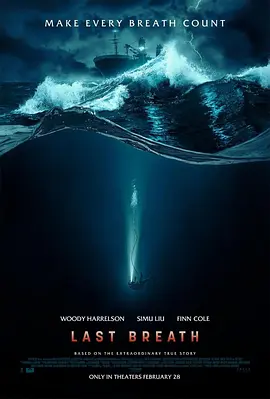
Last Breath
Director: Drama, Thriller
Cast: Woody Harrelson, Simu Liu / Finn Cole, Cliff Curtis, Mark Bonnar, More...
User Rating: 6.4/10 (3156 votes)
"Last Breath" is a film based on a real submarine disaster in the North Sea of Scotland in 2012. When experienced deep-sea diver Chris was on a mission in the North Sea, a huge storm caused the ship to drift, and his oxygen tube was cut off, trapping him on the seabed, with only 10 minutes of backup oxygen! In the dark sea storm, the captain, technicians, and the leaders of the diving team Ducan (Woody Harrelson) and Dave (Liu Simu) worked together to launch a thrilling rescue operation. Before watching the movie, S asked me, if the backup oxygen only lasts 10 minutes, why can the movie be shot for 90 minutes? Shouldn't it be finished in 10 minutes? I said, maybe there is a synopsis of the previous story, reminiscing about life, or it is like "24 Hours", shot from one person's perspective. After watching it, I found that these are not all correct. The main reason is that after the oxygen was exhausted in ten minutes, the protagonist still lasted for 30 minutes! I won't spoil the result, you can go and see it for yourself. Although the film is only 90 minutes long, I appreciate the compact rhythm of this purely commercial film. The story is told neatly, without dragging or over-exaggeration, which is enough. The theater also maximized this effect. As soon as the lights were turned off, the music, pictures and photography came out, which immediately made me understand the difference between a movie that can be released in theaters - even a small commercial film - and a streaming network movie like "The Canyons". First of all, the authenticity of the details. Compared with "The Last Breath", "The Canyon" looks like an AI cutout. Although a beautiful interior scene was built, the rest is all cutout CG, which is completely unreliable. It feels like the male and female protagonists are playing the Sims. Such an old tower, but the interior is brand new. There was a blizzard outside, and the heroine came out in shorts, as if there was no use for the blanket on her body that might fall off at any time. Look at the rust, iron cages, and mechanical air pipes in "The Last Breath", and the difference is obvious. The second is the problem of logic. The setting of "The Canyon" is pleasant, especially the uninhabited forest tower in the subarctic zone of the northern hemisphere, which is simply a paradise for I people, but the various story logic loopholes are like a sieve. In contrast, "The Last Breath" is adapted from a true story, and the whole story is very solid. The director also made a documentary for this movie. Chris lasted 30 minutes without oxygen, which is a miracle in itself, but what is more miraculous is that the team did not give up on him. From the captain, the first mate to the technicians, as well as the leader of the diving team Ducan and the silently dedicated Dave, the cooperation, courage and human brilliance of the entire team who never abandon or give up, regardless of the final result, is the biggest miracle. Finally, I would like to use a paragraph to praise Simu Liu. In mainstream North American movies, Simu Liu is almost the only East Asian face who can play the leading role - I am not talking about TV series and movies with Chinese as the main characters. Do you know how difficult this is? Compared with Chen Sicheng's boastful "🍬探1900" which illogically incites national sentiment, seeing more and more Chinese appear in European and American film and television circles is to do things step by step in a down-to-earth manner. To give an inappropriate analogy, if you support not overfishing, then there is no need to yell at your parents at home not to eat fish. Going to the school community to call on everyone not to eat fish is doing things. Simu Liu's emotional acting is actually not very good, but once the action is added, it is very qualified, and he plays the image of a taciturn but brave and kind comrade-in-arms. Simu Liu is really the pride of the Chinese!
Read Full Review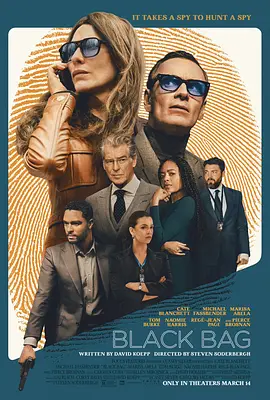
Black Bag
Director: Drama, Romance, Suspense, Thriller
Cast: Michael Fassbender, Cate Blanchett, Marissa Abela, Tom Burke, Naomie Harris, More...
User Rating: 6.0/10 (6359 votes)
It feels like authentic British humor, and it was made by an American director and screenwriter. It's quite surprising to think that the editor of Jurassic Park and the director of Ocean's Eleven were both very similar. Let me tell you some interesting details, including spoilers: - At the beginning, when the male protagonist went to find the informant, the informant was hugged by many women and said that he just cheated accidentally. The male protagonist persuaded him to go home, and the informant actually went back. In the next scene where the informant was about to die, the informant was at home discussing going out with his wife on the weekend to ease the relationship - When the male lead pretended to lose his work badge and went to find the female lead, the female lead's boss was shown in the meeting room for the first time. The old Bond showed his sovereignty by switching the glass. - When the male protagonist said goodbye to the female protagonist on the night of the trip abroad, he first spoke French and then German, because both languages are used in Switzerland. The female protagonist frowned slightly after hearing this, which also showed that she seemed to realize that the male protagonist was checking her out. - In the meeting after the vulnerability incident, Uncle Fa delicately showed the panic beneath his calm surface. If you look closely, his hands were shaking when pouring water, and his reaction after leaving the meeting room was also panic. - The first time the male protagonist went to the river to sort out the situation, he didn't catch anything, and he had no clue. The second time he went with the black agent, he caught a small fish, which corresponds to the black guy. The big boss was not caught, but he was eating a still-living fish, implying that he was the big fish and could survive the best. - The body language of the big devil leaning forward to press the elevator button with old Bond in the elevator is so powerful, it instantly expresses the meaning of dominance
Read Full Review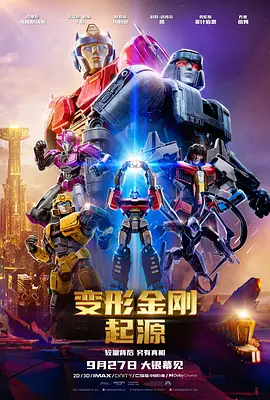
Transformers One
Director: Action, Science Fiction, Animation, Adventure
Cast: Chris Hemsworth, Brian Tyree Henry, Scarlett Johansson, Keegan-Michael Key, Jon Hamm, More...
User Rating: 7.9/10 (85111 votes)
There was a movie that I watched during the Mid-Autumn Festival. I didn't pay much attention to it at first, thinking that the good reviews were all made up by the so-called media. But after watching it, I felt that it really lived up to expectations. It was the latest "Transformers" animated film "Transformers: Origins". The story type is still science fiction adventure. The imaginative world structure of Cybertron and the robot design that is relatively restored to the old animation can indeed impress many animation fans. However, what I want to say most after watching it is the strong and simple revolutionary issues contained in the film and the dystopian narrative that is closely related to reality. There is no extra human perspective, but the experiences of the Transformers are presented in a revolutionary discourse that is unique to humans . Before becoming the Autobot leader Optimus Prime and the Decepticon leader Megatron, Orion Pax and D-16 were two ordinary miners who had to mine energy in dangerous underground environments every day. Although they are good brothers, their personalities, attitudes and philosophies are completely opposite. Orion Pax is a miner with his own ideas, courage to challenge and break the rules. Although he does not believe in the saying "Are kings, princes, generals and ministers different in kind?" and wants to overthrow it, he is upright in his bones, which also lays the groundwork for him to break the rules and participate in the competition, thus starting a series of adventures and uncovering the conspiracy. D-16 was not yet the leader of the Decepticon faction at that time. He worked according to the routine every day and believed in all the information transmitted to him by his superiors. It was a bit like accepting everything, but at that time, it was still peaceful on the surface. D-16 collected stickers of the original Thirteen King Kong, who were the first to resist the Five-Faced Monster, like a fanboy, especially Megatronus, who later became the Fallen King Kong. However, the blackening of D-16, his believer, cannot be regarded as fate, as it also involves some personality and even external factors, which will be discussed later. By accident, they discovered the secret of the current leader, Yu Tiandi - under the pretext of finding a leadership module, he secretly surrendered to the Quintessence of the Five-Faced Monsters, and even exploited his own people in order to provide energy for the enemy. He ordered his subordinates to intensify energy extraction and continue to exploit the miners. What's even more terrifying is that the Skyrim also covered up the Transformers' early memories (tampering with history). Each Transformer originally had gears and could transform, but in order to consolidate its rule (the key point is to remove the military power and monopolize the military and political affairs. Who would want their own people to have guns, be able to transform, and rebel?), the Skyrim took back the transformation gears (depriving the people of their nature) and unified management (dividing the class, and classifying people by whether they can transform or not). It is not difficult to find that the background description of the origins of the Autobots and Decepticon leaders in "Transformers: Origins" is very consistent with the early revolutionary situation. Internally, the upper class exploited the lower working people to the utmost; externally, they put on a fawning face, ceded land, paid compensation, and sold out the country for personal gain. It is difficult not to associate this narrative system with the history of my country's new democratic revolution. Even Optimus Prime's inheritance of the will of the Thirteen and the battle between Optimus Prime and Megatron are more or less closely aligned with certain nodes in history. Interestingly, the revolutionary process presented in Transformers: Origins also conforms to the stage of the New Democratic Revolution. The railway coal miners' strike and the miners' uprising called by Optimus Prime are very similar, both of which are sparks of revolution that burst out from the working class. Let's look at the ruling class. Transformers: Origins portrays Megatron with a very modern feel. I'm not pedantic, but I claim to be superior; I'm not undemocratic, you see, I even give you the competition to make you happy (although this kind of "nipple fun" is also divided into classes, not everyone can participate). So the Cybertron led by Megatron is not the Big Brother-style 1984, but a brave new world - A treasonous clown maintains the current false prosperity with the principle of entertainment first. This is the simple revolutionary tone of "Transformers: Origins", and what follows is the love-hate relationship between Pillar and his fanboy Megatron. Of course, compared to Zhuzi’s helplessness and the magnanimity of a true leader, the darkening of his fanboy is more interesting. From a justice perspective, both Megatron and Megatron are traitors. One betrayed the original Thirteen, and the Quintessons took advantage of the situation, which was considered treason; the other was more different, he only betrayed his allies (on a friendship level), and his inner persistence remained the same, but it was just more extreme. It is reasonable for Megatron to turn evil. What he had before could not be considered self-awareness, and he was not even as optimistic as Bumblebee, who could still find fun for himself while being locked up alone on the 30th floor underground. You can think of Megatron as a rationalist who has spent the first half of his life pursuing an absolute idea. His thinking is relatively extreme, but the premise of this extremism is his support for absolute justice (obedience) and the betrayal of "absolute justice" (Yu Tiandi). Faced with the hypocritical behavior and treasonous behavior of the upper class such as Megatron, Optimus Prime felt that he needed to awaken the people first, unite all the forces that could be united, and proceed step by step from the bottom up; while Megatron's attitude towards this was "an eye for an eye", the same form of revenge, and he would fight if he disagreed! Although his purpose was also to maintain justice in his heart. This kind of thinking develops to a later stage, once in power, or continues to be paranoid, it will turn into an extreme attitude of "whoever stands in my way will die". In the film, Megatron's final act of abandoning Optimus Prime and slaughtering the former supporters of Megatron are all extreme reactions after his beliefs are shattered. Since everything is fake, I will build a new order on the ruins. What was once promised has become a lie forever. This is the tragedy of the cool movie "Transformers: Origins", and it also echoes the transformation of student movements in the late 1960s and 1970s into terrorism (just look at the attitude of the Japanese right wing towards the Japanese United Red Army). At this point, the reasons for the formation of terrorism are no longer important, and he was exiled along with the Holy Knights. Former comrades parted ways because of the "instigation" of a clown, and took different paths due to different choices. What is even more tragic is that what they advocated is still the same, the thing that truly belongs to the people, which has been manipulated by the upper class and has not been fulfilled so far.
Read Full Review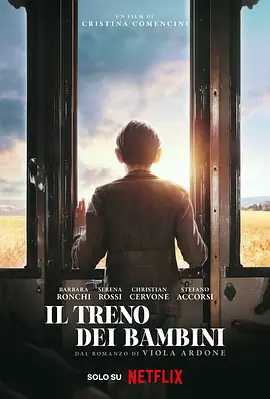
Treno dei Bambini
Director: Drama, History
Cast: Christian Cervone, Barbara Ronchi, Serena Rossi, Stefano Accorsi, Francesco di Leyva, More ...
User Rating: 7.6/10 (788 votes)
Among the films I watched recently, the two most tear-jerking ones, "My Favorite Cake" and "Child's Heart Train", are both directed by women. To be honest, I didn't pay attention to who the director was before watching them, but the impression is not deceptive. "Even if there are no descriptive, bloody, violent, or war scenes", it can still make people want to watch it deeply. It is almost the work of female directors. I am not dragging it down, but the female perspective is different. The language of love is outlined in the details, but it is never too sensational. It is restrained at the right time and the camera is restrained. It is probably a kind of female psychological language: because women understand love too much, when they really depict the scene of love, they leave many meaningful fragments and aftertastes, instead of directly cutting the picture in front of you, which is as boring as uncovering the answer. There are many great male directors, including those with scene arrangement and grand worldview, but when describing love, they seem to lack a kind of imagination. It is so interesting. When watching a movie, you are tasting the director's subconscious projection and emotional pattern, and who is behind the camera lens? This emotion cannot be hidden. Or let's put it this way, when male directors film maternal love, they always use the theme of "sacrifice", that is, the mother dies for her child, or the mother sacrifices the happiness of the rest of her life for her child, or the mother gives up something. The purpose is that a mother must be strong, and motherhood contains too much content about self-sacrifice and carries too many private implications. However, stories of maternal love shot by female directors are always more "gentle" to women. Letting a child go is love, accepting a child is love, sometimes coldly pushing a child away is love, but "not forgetting to live your own life" is also love. Female directors are good at shooting women who "live according to their own wishes but also love their children." So I understand that we really, really need more female directors. We need more female directors to shoot "women". For example, the role of "mother" has always been shot by male directors, with all kinds of private goods in patriarchal narratives, and is suffocated by the definitions of "sacrifice", "virginity" and "selflessness". If more female directors shoot women from the perspective of women, then the definition of the word "mother" will move towards new connotations in female narratives. More female directors are filming "what is motherhood" instead of male directors defining what motherhood is. Whoever holds the camera to express ideas is a kind of power in itself.
Read Full Review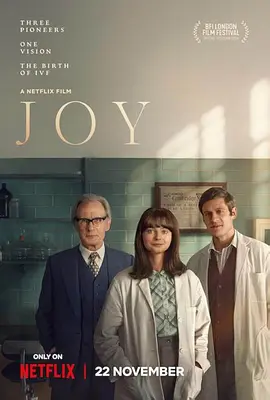
Joy
Director: Drama, Biography, History
Cast: Thomasin McKenzie, Rishi Shah, James Norton, Nikolaj Shulick, Adrian Lukis, More...
User Rating: 7.5/10 (1394 votes)
What touched me the most in this movie was what the head nurse said: "We are here to provide these women with choices." Whether it is abortion or IVF, it is a choice that should belong to women and is an option that science can provide to them. At the beginning of the year, I interviewed a patient with cervical cancer during pregnancy. For a young woman who is extremely eager to have children, the cruelest thing is to tell her at the same time: Congratulations! There is a new life growing in your uterus, but unfortunately, there is also a tumor in it that will take your life. Many hospitals advised her to stop the pregnancy and treat the cancer as soon as possible, but she was very determined. She told me that she wanted to keep the child no matter what. Finally, only our hospital agreed to treat her. Two department directors performed an operation together, helping her deliver the baby and remove the tumor at the same time. The baby is very healthy and the mother is very happy. The teacher told me that this is very worth promoting. In the past, you would never have thought that women with cervical cancer could still have children. To be honest, I couldn't agree with her at first. I couldn't understand why this woman risked her life to have a baby. I even criticized her recklessness in my heart and thought her persistence was stupid. And although the treatment and surgery were very difficult, I didn't understand why the hospital promoted the practice of giving birth with tumors.
Read Full Review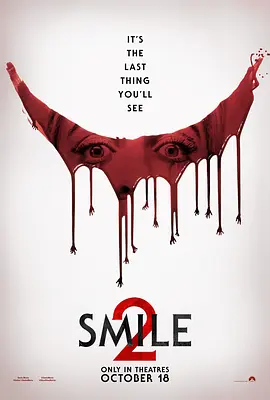
Smile 2
Director: Suspense, Thriller, Horror
Cast: Naomi Scott, Rosemary DeWitt, Lucas Gage, Miles Gutierrez-Reilly, Peter Jacobson, More...
User Rating: 7.0/10 (37812 votes)
The series "Dangerous Laughter" has an interesting design: the identity of the heroine and the setting of the fake smile demon complement each other. In the first film, the heroine is a psychiatrist who wants to help patients, but cannot believe what the patients see; when she herself is haunted by evil spirits, she personally experiences this pain. In this film, the heroine Skye is set as a star who is the focus of everyone's attention. The ubiquitous fake smile has a double meaning: it is the illusion of evil spirits, and it is also her real situation. Although surrounded by applause, no one cares about herself behind the halo. In short, it is loneliness. Even if you are in a crowd, you will become a lone prey. Irony, which was just a spice in the first film, becomes very important in this one. The director seems to have deliberately emphasized this point, wanting to make this film profound. The most exquisite part is undoubtedly the dancing of smiling faces in the mansion on the eve of the tour; the horror atmosphere reaches its peak, and it also completely reveals the dilemma of the heroine. Her team and fans are just like these smiling phantoms, who come with smiles on their faces, but can only add fuel to the fire. Before Skye met Morris, it was also the fans who pushed her away from this last straw. After the "smiley dance", Skye went down all the way, rushing to the destined ending in the illusion. The director used the same trick again. The only friend Gemma who he trusted never appeared, and Morris who could help him was not real. When he opened his eyes, he was wearing clothes he didn't like, still standing on the tour stage, performing the most gorgeous suicide in the spotlight, and the spectators all became prey, and the irony was bursting out. This part of the plot is very similar to "Some Kind of Material", especially the monster that broke out of the body at the end. Whether in terms of characters, plot (second half) or theme, this work is like a sister film of "Something Substantial". The difference is that "Something Substantial" is an art film that focuses on satire, using horror elements to strengthen the expression; while "Smile 2" is a pure horror film that sublimates the theme. The design of this work is simpler and the satire is more direct. Although there is a slight disconnect between the beginning and the end, it is unexpectedly powerful. Which of the two works is better or worse is a matter of opinion. There is a small bug: one of the victims in the previous film was a professor who committed suicide in class, and only one of his students was infected. According to this inference, no matter how many people saw Skye's death, the fake smile demon can only infect one person. Thinking about it this way, the fake smile demon seems to have worked in vain. However, the ending is too shocking, so we should still ignore the imperfections in the setting.
Read Full Review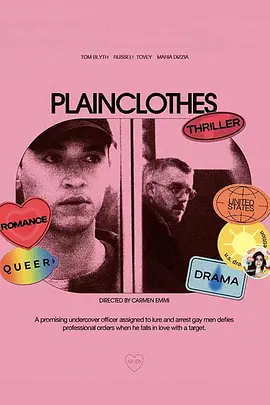
Plainclothes
Director: Drama, Romance, Thriller, Homosexual
Cast: Tom Blythe, Russell Tovey, Maria Dizzia, Christian Cooke, Gabe Fazio, More...
User Rating: 7.9/10 (5353 votes)
"Plainclothes Police" and "Brokeback Mountain" do have many similarities, presenting the persecution of homosexuals in a homophobic social environment and the exploration of nature under the moral constraints of sexual repression. The casting of "Plain Clothes Police" is relatively reasonable compared to "Brokeback Mountain". The actors of the fishing enforcement police are necessary to meet the character setting. Most of the castings for same-sex stories are handsome men and beautiful women, as if those with ordinary looks or bad looks are not even qualified to fall in love. The same is true for heterosexual stories. There are even lines that describe handsome men and beautiful women as "ordinary". The casting is completely inconsistent with the character setting, just like I can't believe that Yuan Quan said the classic line in the stage play "Jane Eyre": "Do you think that because I am poor, humble, ugly, and short, I have no soul and no heart? You are wrong! My soul is the same as yours, and my heart is exactly the same as yours! If God gives me a little beauty and a little wealth, I will make it difficult for you to leave me, just like it is difficult for me to leave you now." This is a problem of audio-visual art form and audience aesthetics. Most humans are visual animals, and the Internet images of film and television dramas continue to strengthen the unified mainstream aesthetics. In recent years, domestic film and television dramas have seen another type of casting that does not fit the characters. Many handsome men and beautiful women are cast with actors with non-mainstream aesthetics, which has been ridiculed by netizens and audiences. It is remembered that more than ten or twenty years ago, there were all kinds of beauties blooming on the big and small screens, but nowadays, beauties are hard to find. The casting of Brokeback Mountain was criticized by the original author Annie Proulx. After the movie was released, many viewers followed their five senses and paid more attention to the love story, which weakened the criticism of the times. She received many fan fiction creations that arranged various new boyfriends for Ennis after Jack's death, which completely deviated from the main theme. She hoped that she had never written this story. The original focus is not the love between two men but the mental state and moral environment of homophobia in a specific era and region. For details, please see the original report Brokeback Mountain creator Annie Proulx regrets writing story. If the original casting was selected, it would not have become a classic love movie with so many audiences today. The two straight male actors were too shy to let go when performing the sex scene, but the two female actors exposed their breasts when filming the heterosexual sex scene. Ang Lee may have filmed it for straight male and straight audiences. It is also a merit to let homosexual-themed movies enter the mainstream vision. I remember that I went to the night market to buy pirated VCDs just for Anne Hathaway. I didn’t know the other actors, I was ignorant about sex and unfamiliar with the era, so I didn’t have much impression after watching the movie. Why didn't the film cast the characters according to the original novel? Because what Ang Lee wanted to film was love. He said, "To create a great love story, there must be huge obstacles. The two protagonists are in the American West, where there are masculinity and traditional values. Therefore, everything they feel must be kept secret. It is a precious, special thing that they cannot describe." This sentence also applies to the later "Lust, Caution". The era is not the focus, so it is no wonder that the sex scene is exaggerated to try to rationalize the psychological changes of the characters, and Mr. Yi is sad sitting on the bed after Wang Jiazhi is executed at the end. I still remember that the media hyped the deletion of the seven-minute nude sex scene. Many mainland audiences went to Hong Kong to watch the full version. Later, it was reported that Tang Wei was "banned". I couldn't help but sympathize with her and cut out the next report as a newspaper clipping. The deleted version of the screen shot pirated disc was circulated on the market. It was not until many years later that I had the opportunity to see the full version. After being eroded by various capitalist films in Europe and the United States, I no longer care about large-scale real and fake. When fake is true, true is also false. The truth is actually not important. Choose the one you are willing to believe in, which is your "truth". Of course, adaptation is similar to the secondary creation of fan fiction. The director can have his own understanding of the story, even if it is a disfiguring adaptation. The creator does not have to fear the judgment of the original party. Seeking common ground while reserving differences has its own merits. "Plain Clothes Police" is told from the male protagonist's perspective throughout, inviting the audience to enter the story and empathize with the characters to feel their psychological changes, from suppressing their nature to carefully exploring and finally awakening to facing their true selves. The police and the priest are filmed with a lot of sexual tension, although the audiovisual aspects are a bit flashy and showy. "It'll pass." Is this a slang term exclusive to priests? It immediately reminds me of the ascetic priest in the second season of "Fleabag". Coincidentally, both of them are named Andrew. I can't help but suspect that the director did it on purpose. There is still tomorrow: decriminalization of homosexuality. The 1961 film "Victim"was the first English film in film history to directly mention homosexuality. There was no same-sex sex scene in the whole film. In 1967, the UK passed the Sexual Offences Act to decriminalize homosexuality. Homosexual behavior in private places by men over the age of 21 was no longer a crime. Many people believe that "Victim" promoted legislation to some extent. In the United States, it was not until 2003 in the case of Lawrence v. Texas that the Federal Supreme Court overturned the fines imposed on John Lawrence and Tyron Deviant. This ruling overturned sodomy laws (this law is mainly used to prosecute same-sex sexual behavior in the United States) across the country. Homosexuals have the right to establish their own intimate relationships without interference from state laws. At present, 67 countries still convict homosexual behavior, mainly concentrated in the Middle East, Africa and Russia. Among them, 11 countries can impose the death penalty, including Afghanistan, Brunei, Iran, Mauritania, Nigeria, Pakistan, Qatar, Saudi Arabia, Somalia, the United Arab Emirates and Yemen, of which 8 are Asian countries. According to the survey, the death penalty is still being carried out against LGBTQ+ groups in Iran, northern Nigeria, Saudi Arabia, Somalia and Yemen, while the death penalty is still a legal possibility in Afghanistan, Brunei, Mauritania, Pakistan, Qatar and the United Arab Emirates. The new Criminal Law of mainland China in 1997 abolished the crime of hooliganism, which is considered to be a sign of the decriminalization of homosexuality in China. The current official attitude is similar to "neither support nor oppose nor advocate", and the mainstream public opinion does not agree. The crime of hooliganism is a crime stipulated in the Criminal Law promulgated in 1979, which refers to openly defying national laws and social morality, gathering to fight, provoking trouble, insulting women or disrupting public order and other serious acts. In the 1983 crackdown campaign, the penalty was expanded to the maximum of death. After the 1997 revision, the crime of hooliganism was abolished and it was divided into the crimes of forced indecency, child molestation, gathering for promiscuity, gathering to fight, provoking trouble, etc. The outlet of desire When it comes to the crime of "gathering for lewdness", I think of the report in 2023 that 6 men in Hangzhou were arrested for gathering for lewdness. Many netizens expressed homophobia, while the case of 10 men and women gathering for lewdness in the same period was ignored by most media. Is it because the public is accustomed to the lewdness between men and women and therefore it has no news value? In 2009, there was a "swapping spouse" case involving 22 defendants (14 men and 8 women) that caused a huge public opinion storm. According to the prosecution's data, from the summer of 2007 to August 2009, 22 people participated in 35 gatherings through forums or QQ groups. Among them, the main culprit Ma organized or participated in 18 gatherings, and 14 were held at his home. Among them, there were only two couples, some for seeking excitement, some for improving the relationship between husband and wife, and several women had this sexual fetish. . Ma is an associate professor at a university in Nanjing, divorced and single. He believed that the activities did not constitute a gathering for lewdness and defended his innocence. The other 21 defendants all pleaded guilty, and the case was not heard in public. In the end, he was severely punished for his lack of clear awareness of the social harm and illegality of his behavior, and was sentenced to 3 years and 6 months in prison. Others had a good attitude of confessing their guilt. 18 defendants were sentenced to fixed-term imprisonment ranging from 1 year to 2 years and 6 months, of which 14 were given suspended sentences, and the remaining 3 defendants were exempted from criminal punishment because of their minor crimes and voluntary surrender. The number of people involved in this case set a record since the establishment of the crime of gathering for lewdness, and it was the first time that a person was sentenced to actual imprisonment for this crime. In 2006, a domestic drama "Don't Dance with Strangers"involved the issue of spouse swapping. In the past, the themes of domestic film and television dramas were more diverse than today. Li Yinhe once said that the crime of group lewdness is seriously outdated and suggested abolishing it. She said, "As far as I know, developed countries do not have the crime of group lewdness." "The earliest case of spouse swapping in China occurred in the 1980s. Four middle-aged couples, intellectuals, swapped spouses. The leader was shot, and then one was sentenced to life imprisonment and another to 15 years in prison."
Read Full Review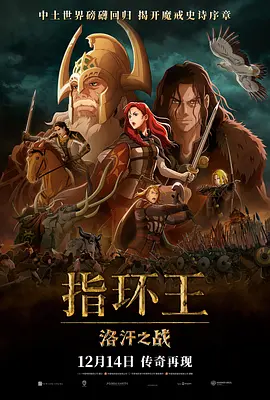
The Lord of the Rings: The War of the Rohirrim
Director: Drama, Action, Animation, Fantasy, Adventure
Cast: Brian Cox, Gaia Wise, Miranda Otto, Luke Pasqualino, Lorraine Ashbourne, More...
User Rating: 6.1/10 (9014 votes)
After watching it, I felt like I had drunk a bowl of broth that Éowyn handed to Aragorn. The ingredients were the same, but the taste was really not the same. It is an unforgivable mistake to make the protagonist of Helm's daughter, who has no role in the original book and whose name is unknown (in fact, she is an original character). This is not a female power moment - it is equally bad to set this character as a princess who yearns for freedom, an unwelcome bastard, or a hobbit from the Shire, because it should not exist in the first place. The consequence of this is that the sense of fate and heroism in Tolkien's works were directly destroyed, because the tragedy of the severance of the first line of Rohan became "just the death of the protagonist's relatives and friends", and the distant epic myth became a second-rate adventure animation. So we can see that Hareth, who led the guards to defend Edoras until the last man fell, was a reckless man who was shot through the throat after showing off his strength after successfully fighting the mammoth in the movie. Another son, Hama, died by being captured alive and executed in public. The giant eagle that the Lord of the Rings was unwilling to give away can be fed by humans and help transport the nostalgic equipment... These are nothing. The most ooc character is Helm the Hammerhand himself, who was deprived of the protagonist's position. The Rohan are martial but not stupid. Helm is praised first because he is a leader: a resolute leader who can withstand great grief and lead his people to survive in the desperate situation of a long winter, go out alone to kill the enemy until the opponent is terrified, and finally die standing on the eve of victory. So after the war, the Rohan people spontaneously called the Hornburg Helm's Deep. If it was the demented wild man in the movie who surrendered in public on the city wall, was devastated after the death of his son, and finally gave himself up at the beginning of the siege because he couldn't open a door (literally), I'm afraid the first people to overthrow Helm would be the residents of Helm's Deep. In Tolkien's writing, the reason for the defeat in the Battle of the Fords of Isen was that Rohan and Gondor were invaded at the same time as planned, not because Helm was so stubborn and arrogant that he refused to ask Gondor for help as in the movie. The setting of Hera and the short and shy attendant (I really can't remember the character's name) seems to be a replica of the princess and Merry in "The Return of the King", but the strength of the weak should be reflected in wisdom, courage and skills, rather than luck and logic. The soundtrack, storyboards and Eowyn's narration earned me one star, but that's it. The ending song is very nice, but I'm very angry.
Read Full Review
Mufasa: The Lion King
Director: Drama, Animation, Musical, Fantasy, Adventure
Cast: Aaron Pierre, Kelvin Harrison Jr., Tiffany Boone Mads Mikkelsen, Preston Nyman, More...
User Rating: 6.6/10 (30059 votes)
"The Legend of Mufasa" is the prequel to "The Lion King", telling the story of Simba's journey to become king. Generally, films where the protagonist goes from being an inexperienced person to a perfect man need to be paired with a symmetrical character who is both evil and complex, otherwise it will seem old-fashioned and boring. Captain America needs the Winter Soldier, Thor needs Loki, Optimus Prime needs Megatron, Zhang Junbao needs Dong Tianbao... Mufasa is a classic epic hero who constantly demonstrates his bravery, wit, nobility and tenacity, and is unbiasedly following the path of growth as a great screen hero. And all the dishonorable but more chewy good scenes were left to his good brother Scar, or his original name, Taka. Some people say that this movie is more like a story about how Taka turned into Scar. But this statement is not correct. What is blackening? From the perspective of basic commercial film values, it means that a good person turns into a bad person, betraying and harming his former allies. But to describe Taka as evil is to underestimate him. From the beginning to the end, it was not a question of Taka getting better or worse, but that he never changed. He is not like the Winter Soldier who was once brainwashed into a minion of Hydra, nor is he like Loki who has been a harmful person since childhood but sometimes shows some friendship, and he is not like Megatron who would kill his old friend once he changed his mind. It seems that Taka's behavior is wavering. Sometimes he is overwhelmed by jealousy and wants to destroy himself along with the other, and sometimes he misses his old love and risks his life to save the other. It seems that what he wants is never fixed. But behind all the changes, what he really pursues, or the core desire that dominates him, has always been the same. He was once a prince of noble status, and his parents had high hopes for him to be the new king. They might have been able to see that he was not cut out for it, but they still taught, trained, demanded and expected this of him. However, no matter how hard he tried, Taka could not meet the expectations. He was like a mediocre student who always hovered in the middle of the class and knew better than anyone that it was impossible for him to be admitted to a prestigious university. Despite having such a strict father and such a well-mannered mother, Taka still did not show the qualities of an heir. When faced with the enemy, he abandoned his family and ran away in panic, which was the final conclusion of his talent. Fortunately, he made the right choice when he was young. He rescued Mufasa from the water and insisted on begging his parents to let them become brothers. From childhood to adulthood, Mufasa was the only lion who never put pressure on him, never embarrassed him, and allowed him to escape from his weakness. The torment he felt from wanting to live up to his parents' ideals but failing to do so was released through the joyful play of his brothers, which allowed him to maintain a minimum level of pride as a lion. But until his parents were killed, his tribe was destroyed, he embarked on the road of escape with Mufasa, and fell in love with the same girl, his only spiritual support began to collapse. Remember after he saved Mufasa from the cliff, he said to him: I saved you, won’t you say thank you to me? He needed this feeling of being needed so much, but in the subsequent journey, he had to face the ceiling of his potential again and again. He had to watch Mufasa, a homeless child with a far inferior background than him, who was gifted and constantly resolved crises along the way and outshined him time and time again. The lion in his heart was taken away, which was just the last straw that broke the camel's back for his emotional castle. His father's words "deception can also make a king" were just an excuse he used to exonerate himself. He betrayed his friends not out of jealousy or revenge for love. He just wanted to break free from the quagmire of inferiority and regain the little pride he had. When Taka betrayed Mufasa with a clear conscience, we realized that he had changed. His tone became calm, his eyes became firm, his head was no longer lowered, and his body was no longer hunched over. Taka, who was seen before, the one who spoke hesitantly, had an uncertain look, and always hid in the corner secretly tasting the bitterness of incompetence, suddenly disappeared. He's doing an evil and crazy thing, but this is the closest we've seen him be to a lion in a long time. He was finally no longer the poor guy who was outdone and needed credit, and he regained control of his own and others' destiny. With Taka's assistance, the evil lions followed, but when the final battle came, Taka changed sides and returned to Mufasa's camp. Because seeing Mufasa dying soon aroused a pleasure in Taka's heart that was stronger than betrayal: I am finally no longer a weakling. I have the ability to save you once again. Even if I lose my life, even if I am exiled by you, even if I am despised for the rest of my life, I don't care. The moment when Taka steps forward to rescue Mufasa and is left with a disfiguring scar, and when he grabs the drowning Mufasa and lifts him out of the water, these are his particularly charming moments, especially the latter scene, which echoes in the theater with loud musical notes, and its passion even surpasses the heroic moment when Mufasa kills his opponent. Rafiki said to Mufasa that your bloodline is not important, your character is important. And Taka's story is saying that your character is not important, what matters is whether you have the courage to face it and fight it. Many characters in this movie dream, and their dreams contain their ideals and future, but Taka never mentioned it. Does he dream? In the dream, he may not be the king and may not get love, but there must be countless scenes in which he fearlessly protects his brother and receives his sincere gratitude, just like when they first met. There is nothing dark about Taka's life, and I can't classify him as a villain in any sense of the word. He was a child who had never been satisfied and spent his entire life replicating the moment he was most proud of.
Read Full Review
Sonic the Hedgehog 3
Director: Comedy, Action, Science Fiction, Animation
Cast: Ben Schwartz, Jim Carrey, Keanu Reeves, Idris Elba, Colleen OShaughnessy, More...
User Rating: 6.2/10 (9970 votes)
When the movie's Easter eggs are released, the concept of similarity becomes a thread from between species to between bionics and species. The appearance of the Easter egg has nothing to do with Sonic, but the image that is quite similar in outline is a robot. In other words, it forms a very obvious representational similarity, which, in Deleuze's words, is a body without organs. Of course, it is to prepare for the fourth Sonic the Hedgehog film, and perhaps also to open up a parallel world, telling a story of alternating cuteness and fear. In "On Cuteness", Inuhiko Shihoda talked about how cute and scary are adjacent in Japanese. Think back to whether this is also true for the movie? Yes, although Dr. Eggman, played by Jim Carrey, and his grandfather have a strong affinity, the audience can still regard them as a control group of a complex relationship that goes on different paths. By the time the third part begins, Dr. Eggman has regressed into a very typical middle-aged otaku. He possesses advanced and cutting-edge science and technology, but the mechanical crab stays on the bottom of the sea and no longer travels. He has given up the idea of ruling mankind, and instead pursues his own inner peace zone. So we see the show he watches, in which brothers compete for the same person but the pictures are in black and white - he holds a very obvious decisiveist idea, if I go out I may hurt others or be killed, so I don't need to go out of this door - what's more, cutting-edge technology has provided him with enough convenience and economic strength to enjoy a lifetime, so why should he pick a fight with the hedgehog? But his grandfather has been immersed in the great grief after the loss of Maria. Of course, there is also the broken belt that imprisoned him for 50 years. In this movie, grandfather is not only a relative, but also means a mark of values, that is, because of the change of time, he no longer belongs to this world, so what grandfather thinks of is the third way besides domination (control) and regression (self-entertainment), that is, to destroy everything. This sounds a lot like what Obito from Naruto did. To be precise, it was the fragmentation of the individual narrative (the death of Lin/Maria) that led to a major upheaval in the grand narrative (the Fourth Ninja World War/the destruction of humanity by super weapons). This is what Dr. Eggman's grandfather and Shadow are doing. It's just that Dr. Eggman's team relied on Jim Carrey's comedic actions - especially the scene where the two danced in the red lasers, and the scene where the two fought with mechanical elephant-like animals - to briefly dispel the otaku logic of "socialization = harm". In this case, decisiveness becomes inevitable, "even if it is wrong and hurts others, you have to choose a certain position." This is what Shat did to Tom. He almost killed Tom by mistake (shown in the Easter egg, wrapped in a bandage), and a similar scene of one party trying to wake up the dead by howling in pain was staged again. The movie was afraid that the audience would not remember this similarity, and deliberately added a similar composition of Shat calling Maria. At the beginning, Shadow also insisted on a decisive stance, seemingly to atone for his sins, and also to make Sonic empathize with his pain. After both sides used emeralds to enhance their combat power, when Sonic was clearly at a disadvantage, he mentioned Tom's name again. This led to Sonic's brief and angry outburst, and he beat Shadow to the moon and back to his original form. Yes, the similarity runs through the whole story. Maria's death was not inevitable, but General Walters (the commander) blocked the explosion caused by the soldier's mistaken shooting - the same is true for Shat, he didn't want to kill anyone except Walters' impressive face. And Tom happened to use technology to change his face to become him - this is another similar manslaughter. Of course, Shadow and Sonic basically look the same and are the same species (hedgehogs). In contrast, Knuckles and Tails are definitely not hedgehogs, even though they are both colorful alien creatures (animals). In his aesthetics of double images, Kilar specifically mentioned that the two parties of imitation have a three-stage relationship. As double intermediaries, the two parties are similar in appearance (hedgehogs of the same species); as double constraints, the two parties are emotionally desireful (if Shat does not accidentally hurt Tom, Sonic will not be able to empathize with him. And from the bottom of his heart, Shat does not want to do this); as a doubled relationship of imitation, if there is no outsider, the internal imitator is unaware (it is also Tom's words at the beginning of the movie that awakened Sonic in revenge). In this process, Tom's voice and face are almost a "ghost" form that frees Sonic to return to Shadow's old ways. Let's talk about Dr. Eggman and his grandfather. The grandfather pretends to be immersed in the parent-child relationship with his grandson to make up for the pain of his close relationship with Maria. The clever point is that the virtual scene technology has actually hinted at all this, and the stone agent, an outsider, has been observing it all the time. The apocalyptic disaster caused by Shadow and Dr. Eggman returns to normal life after their self-sacrificial act. In other words, we can regard this live-action movie as a re-read of the game, as Sonic is a character in the game series. At the beginning of the movie, Sonic and his two friends are competing in a game, a running race - this race is actually to re-emphasize the preciousness of daily life. At the finish line is a "victory declaration" brought by a virtual holographic projection, and it is also a surprise "Earth-birthday" held by his family for him. At the end of the movie, the race is recreated, but their running has no end. "Running", the most common scene in the game, has also become the "psychology" that constantly generates scenes in the movie subtitle animation. Only by running continuously (quite like Forrest Gump) can the world become full in the runner's vision. It suddenly occurred to me that "The Girl Who Leapt Through Time" will be released in China soon. This animated film from decades ago is also coming to the big screen in a running manner. But is this kind of running a "phenomenon" or an "embodied" thing? It's like if the Sonic Team took off the more subjective title of "Sonic", whether it's Knuckles or Tails, they can run, so whether it's a gamer or an otaku, they can all run, right? Running itself is not the ability of otaku to "question society", but the perception after losing this ability - so the change is only in the individual (Sonic's personal growth), not in ideology (in the movie, it is the secret service with weapons of destruction). The more obvious contrast is Jim Carrey, in The Mask in 1994 (the prevalence of fanaticism theory) - The Truman Show in 1998 (breaking through the ideology constructed by the media) - Bruce Almighty in 2003 (crazy deviation and return to daily life) - Eternal Love in 2004 (The Third Retention and the disappearance of daily life) - Mr. Popper's Penguins in 2011 (when cute pets become the main body of daily life) - and now in the Sonic the Hedgehog trilogy, Jim Carrey has gradually given up the weapon of criticism and used the criticism of weapons
Read Full Review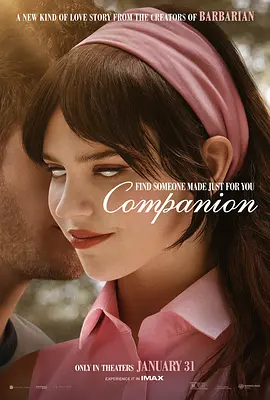
Companion
Director: Science Fiction, Thriller
Cast: Sophie Thatcher, Jack Quaid, Lucas Gage, Megan Surie, Harvey Guillen, More...
User Rating: 6.8/10 (36738 votes)
# Companion# (B+) is not a horror film, but a robot-out-of-control thriller similar to "M3GAN". But the scariest part is not the killing or gore in the film, but the fact that when you watch it, you will learn from the experience of this female robot what some men want in a "partner", and how to control and treat their partners roughly. In other words, although the one who is tortured in the film is a robot, in reality, many real women are also treated like this: being manipulated, subjected to domestic violence, and without freedom and respect. They are living people, not bought robots. This is the most creepy thing. From the beginning, when the male protagonist Josh walks in front with nothing in his hands, and his girlfriend Iris follows behind with two large suitcases, you know that this is not a normal relationship. In real life, most of the time it is the men who help their girlfriends carry their luggage, but here it is the other way around. The smaller girl seems to be the boyfriend's follower. When you know that this girlfriend is a robot, you don't find it strange anymore. But then again, in real life, does every man really carry luggage for his girlfriend (or wife)? Similar scenes keep happening later. Is Josh's control and insults to Iris really just because she is a robot playmate? In fact, everything Iris encounters, whether it is control, brainwashing, manipulation or insults, is endured by real people in real life. In particular, when you find that Josh will adjust Iris's IQ to a very low level (40%) and lower her temper in order to control Iris, so she becomes a very obedient and indecisive girlfriend. In reality, many girls are born to be this kind of obedient and indecisive girlfriend, they are not robots. If there is no way to buy a robot, such women can easily become victims of a toxic relationship. The female robot Iris in the film can also take the opportunity to grab the phone to raise her IQ and immediately transform into a smart and strong woman, but some girls in reality cannot change their IQ and may always be manipulated. But on the other hand, you may wonder, if there is such a robot as a substitute, will it help some girls escape from the clutches of these demons? There are many movies about robots and AI, so the ending should be predictable. Obviously, the audience will stand on the side of the robot, hoping that she can escape from the clutches of the evil and the bad guys will be punished. The whole movie is still full of surprises and twists. AI and technology are not the focus of this film. The focus is on mapping the reality that is prevalent in human society, showing the desires, greed and control of some people, and how women may fall into "inhuman" gender relationships. The film is quite profound and has some relatively novel ideas, and is not a repetition of the same type. In addition, the reason why the heroine is called Iris is that the name is reversed to Siri
Read Full Review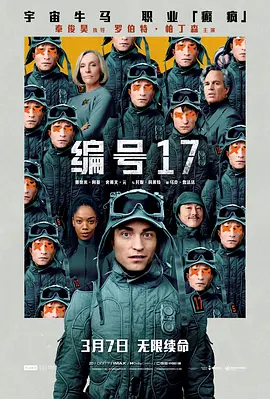
Mickey 17
Director: Drama, Science Fiction, Adventure
Cast: Robert Pattinson, Naomi Ackie, Steven Yeun, Mark Ruffalo, Toni Collette, More...
User Rating: 6.7/10 (78790 votes)
I finished watching the movie No. 17 today. The overall conclusion is that the censorship made this Bong Joon-ho movie, which started out with a score of 8.5, become about 7.5, but smart audiences can still accept the essence of the whole movie. Note! The censorship I'm talking about here is not the deletion of pornographic/bloody scenes in China, but the censorship of film investors; and I don't know who the censors are. Censorship is not uncommon for Hollywood movies. For example, the film producer Warner forced the Wachowski sisters to shoot The Matrix 4 (which turned out to be a meta movie). I found that the tone of the first 2/3 of the movie is very different from the last 1/3. If you regard the narrative style as a human face, these two parts are two completely different faces. The first 2/3, except for a few laughs, is very Bong Joon-ho and very Snowpiercer (Welcome to read my Snowpiercer movie review: How do you evaluate the movie Snowpiercer?). Various plot foreshadowings pushed the audience's expectations to a peak, but the last 1/3 fell down. The metaphors and plots foreshadowed were not recycled, and it led to a childish ending. Based on my experience of watching the film, this is almost certainly the result of an internal struggle. But if we assume that there is a game between Bong Joon-ho and the investors, and bring this game into the film as a meta-narrative, the film will be more interesting . The film is scheduled to be released in North America on March 29, 2024.[17] On January 10, 2024, Warner Bros. announced that the film would be withdrawn due to delays in post-production. The new release date will be announced at a later date. All the following comments contain spoilers. If you don’t want to be spoiled, you can come back after you finish watching the movie. Next up is the official movie review. Bong Joon-ho is a high-concept director who is best at making political metaphors. "Number 17" is undoubtedly a political metaphor movie. The quality of metaphors in "Number 17" is also very good, maintaining the tone of Bong Joon-ho's "Snowpiercer", and using one or two special details to outline the entire worldview. Let me give you an example. When the male protagonist signed a contract to become a "consumable" for the interstellar travel team to collect debts, the signing hall was full of poor people. The poor people lined up one after another, like zombies (like Yomi Hirasaka in Seiya), walking up a spiral staircase shot from above, and waited to go to the top floor to sign. Suddenly, the wind and sand picked up outside, and then the hall played an advertisement for anti-dust masks. From this ten-second scene, we can see the era setting of the movie: Technology is highly developed, and interstellar travel is already possible The Earth's climate is on the verge of destruction, and humans have become accustomed to sandstorms. The social economy collapsed, so the underworld and loan sharks became rampant again. This collapsed society is completely controlled by capitalism. Even job applicants can only buy anti-dust masks at a 95% discount. This kind of information-dense shot appears repeatedly in the movie, and the high-concept world view setting of the whole movie is more interesting than the story itself. This is the Bong Joon-ho I am familiar with, and this movie is undoubtedly his masterpiece. But! But it is obvious that this "film written and directed by Bong Joon-ho" has a very obvious political mission, which is to be anti-MAGA and prepare for the US election . For example: The film's sci-fi background is interstellar colonization, reflecting Musk Hulk actor Mark Ruffalo undoubtedly mirrors Trump in his performance. MAGA symbols appear everywhere in the movie, such as red hats, and are repeatedly mocked. The second half of the film inserts various "deliberate" political correctness, such as deliberately emphasizing LGBT, women's power, etc. I don't need to spoil more of the other points. It was definitely unexpected that this movie was released after Trump's victory. It was obviously a bullet in the campaign, including the irony of the villain Marshall "So you lost the election twice"! ! But the reality is that Trump, who was ridiculed, won the election. This bullet flew for too long and became a joke. Even the scene in the movie where Marshall, who alludes to Trump, is assassinated and has a bullet grazing his face, I reasonably speculate that it was re-shot after July last year. From the beginning (No. 17 returns home) to the whole scene of shooting Marshall, the scenes switch back and forth, and the narrative focus (the clones also have to compete for me in social relations) has also obviously changed. The transition is paved with watered-down jokes (two women discussing the division of two men), and the plot advancement is extremely illogical. If the only goal of this movie is to be an anti-MAGA metaphor, and it fails miserably and slaps itself in the face - then Bong Joon-ho becomes a thug of capital, and a failed thug at that. Too low! But I clearly saw a political metaphor in the first 2/3 that was far more complete than anti-MAGA - it was still Bong Joon-ho's consistent theme, anti-capitalism, and opposition to capitalism's alienation of human beings, especially workers. The normal narrative logic of the movie should be completely centered around the sci-fi concept of "Expandable" (consumable humans), just like the titles of "Snowpiercer" or "Parasite". The plot logic I originally saw should be: As a "consumable", the protagonist is completely alienated, and as a human being he is not treated as a human being. The audience began to wonder what kind of people would choose to become "consumables" Economic poverty and bankruptcy (similar to "Parasite") is the protagonist's superficial motivation for being consumables The subconscious motivation for the protagonist to be consumable is that he believed that he had killed his relatives when he was a child. Believing that one has original sin, and therefore accepting that one is being exploited, is one of the most common entry points for Bong Joon-ho's anti-capitalism. Mickey 17 survives by chance and forms Multiple (together with 18), which is the turning point of the drama. Exactly the same as the excellent work "Moon". Multiple causes the two Mickeys to start competing for social relationships (such as the same lover), and the war of "all against all" escalates to "all me against all me" (Marxist metaphor) In the process of fighting against his other self, Mickey 17's subjective consciousness awakened and he began to "not want to die" It turns out that the two "I"s, No. 17 and No. 18, are not mortal enemies. The capitalist logic that created them (completely alienating humans into labor) is the culprit. Mickey realized that his original sin should only punish himself, and the logic of capitalism that made him suffer was actually making everyone suffer. So he could no longer accept being exploited. ………………Bong Joon-ho’s classic masterpiece……………… Mickey breaks free from the capitalist chains that bind him, and at the same time finds spiritual liberation from his original sin. The story comes to an end. ………………Bong Joon-ho’s classic extremely cold and dark ending……………… In other words, "anti-MAGA" was probably the topic of the investor's essay, and Bong Joon-ho just happened to use it as a sci-fi background. His story was not prepared to be anti-MAGA at all. But it is very obvious that the quality of this movie's plot has declined rapidly since episode 8. All the foreshadowing has been disconnected, and the emotions are not connected. Episodes 9 to 13 have completely become anti-MAGA + white left plots, which can be said to be very childish, not to mention being slapped in the face by reality! In other words, in "Number 17", it was Bong Joon-ho's turn to dance on swords and experience the story of the Wachowski sisters when filming "The Matrix 4". But The Matrix 4 is still a masterpiece for me, the best "meta-narrative" I have ever seen. The directors fully integrated the oppression of the investors and their own incompetence and powerlessness into the plot and intertextualized with reality. The directors kept blowing the dog whistle and blinking their eyes, wanting the audience who could understand the dog whistle to know that although their bodies were kidnapped, their spirits would not be kidnapped. So, is there any dog whistle from Bong Joon-ho in "Number 17"? Haha, that’s right. This is actually the biggest highlight of the movie after it collapses in the second half. The movie seems to be anti-MAGA, but in fact it is anti-Zionism. It reveals a little bit of information in the repeated twists and turns. It is so vivid! First of all, the original sci-fi setting of "Number 17" is a fusion of the Great Flood (the earth is on the verge of destruction), the Exodus (the interstellar ark), and finally God's people came to the "promised land" and lived a fairy tale life of "happily ever after". It's just that this process should not be led by MAGA. The ending of the final version of the movie is also the same. However, this interstellar journey that Bong Joon-ho put together with metaphors is full of anti-utopia, for example: Snowpiercer-style cockroach energy cubes When faced with danger, the employees crawled into the sleeping cabins in the cracks of the wall like cockroaches in "Parasite" Following this tonality, the ending will either be like: Snowpiercer-style ending, bombing the state that causes the historical cycle, when the day comes, I will die with you The ending of "Parasite" is like that of the male protagonist who kills people because of his rebellion against the success theory. His son is instead shackled by the spiritual shackles of the success theory in order to save his father. How could it be happily ever after? The nightmare that was glimpsed at the end of the movie did not assume a "second hidden ending" (a low-level conspiracy theory), but was more like the airport battle at the end of Tsui Hark's "Taking Tiger Mountain by Strategy". This is just a low-level dog whistle. The movie's truly high-level dog whistles are: Everywhere it is hinted that Marshall, the MAGA-style populist leader, is being manipulated. The team operating him is the "church", but as a businessman, Marshall believes that he works for the "company". The church's logo only appears for 0.5 seconds, and it seems to be a variation of the Masonic logo. The bald photographer who had been sucking up to Marshall was the "pastor" who mentally controlled Marshall. This mysterious "church" (similar to SEELE in "EVA") is dedicated to finding the "promised land". After arriving on the planet, the bald "pastor" repeatedly encouraged Marshall to start a massacre first and then go to his death. None of these foreshadowings were recovered at the end of the movie . They all became waste. But we can see Bong Joon-ho's original design: The MAGA leaders are just puppets of a certain Zionist secret religion. This group of people has been plotting behind the scenes, using capital to manipulate political leaders to practice their own beliefs; they use the manipulated populist leaders to help them carry out massacres, clear out the foreigners in the "Promised Land", and then replace these MAGAs as the masters of the "Promised Land". This dark plot should have burst out together with the bright plot of the male protagonist breaking the mental shackles at the end of the plot, complementing each other. But both plots disappeared! OK, let's stop here for the analysis of the movie. After all, I only watched the preview once, so I missed a lot. This split movie is neither a bad movie nor a good one. But if you also understand the reasons for the split plot, the secret game between the director and certain forces, doesn't it become interesting?
Read Full Review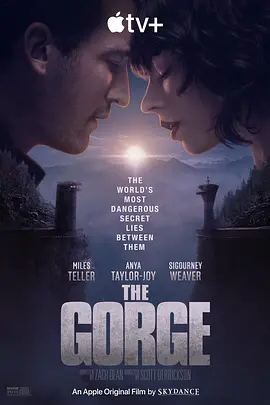
The Gorge
Director: Action, Romance, Science Fiction, Horror, Adventure
Cast: Miles Teller, Anya Taylor-Joy, Sigourney Weaver, Sope Dirisu, William Huston, More...
User Rating: 7.3/10 (70548 votes)
Keep up with current events. The US special services budget was cut by doge, so they hired a freelance mercenary who was short of love. Russia's economy was in a downturn, and in order to cut costs, they hired an ENTP self-employed killer. The whole thing seems absurd, but it actually makes sense logically. Some high-level projects in government departments have been put on hold after a lot of investment but without the desired results. Once the leaders who made the final decision retired or were transferred, no one had the authority to shut down the project, and no new funding could be applied for. A few executive leaders were left to barely clean up the mess, and in the end, there was not enough money for post-maintenance, so they had to outsource the work and hired these two idiots. It was really like drinking soup and spilling it all over your crotch, and wiping your butt and scratching the paper. The two restless people were not like the previous guards who remembered the Cold War hatred and national hatred. They began to pass notes frantically and then to lure monsters frantically. One played music, the other lit up the Christmas tree, and beat drums and gongs just to kill monsters and attract the other side to shoot at them. As soon as they showed their weapons, we knew this was a CP movie. The heroine's main weapon was AKM, while the hero's was M4A1; the heroine's long gun was AXMC precision rifle, while the hero's was Steyr .50M1; the heroine's heavy machine gun was the classic DShK, while the hero's was the famous .50 (Browning M2HB) machine gun. From the weapons, we can tell that they are a strong CP. As for the automatic defense weapons, there is a flaw here. The Americans thoughtfully provided the Soviet side with the Phalanx MK15 Block1B shipborne close-in weapon system, while they used the less high-end M134 minigun on their own side. So it is impossible to kill them at the end of the film. As we all know, dogs never die in this kind of Hollywood movie, and of course, the couple is still considered a dog. Chief villain, you can kill this pair of doomed lovers, but don't do it in a happy love movie that is released on Valentine's Day.
Read Full Review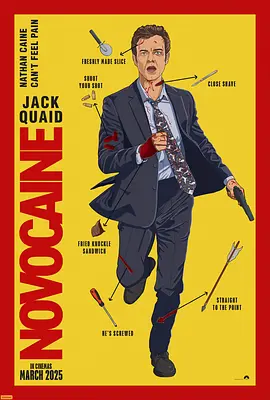
Novocaine
Director: Comedy, Action, Thriller
Cast: Jack Quaid, Amber Mindysand, Ray Nicholson, Jacob Bertalon, Betty Gabriel, More...
User Rating: 6.2/10 (9402 votes)
Nathan Kane, a vice president of a bank, was born without the sense of pain. Under this setting, he can accomplish almost everything. Although novel, it is not scientific. When we were young, "Reader" or "Yilin" taught us that the inability to feel pain is actually a very dangerous disease. Pain is a mechanism for humans to protect themselves. The inability to feel pain means that you are not aware of danger, but put yourself in danger. For example, you don't know if you are hit by someone, and you may die in an instant. But the director doesn't think so. In the setting, "no sense of pain" and "invincible" are almost the same thing. Others would put on a Band-Aid when they fell, but he might not even feel a broken bone when he fell. Originally, his life was ordinary, but his goddess was kidnapped by a group of robbers. In a rage, he fished out a gun from a frying pan, stabbed glass with both hands, and pulled out his fingernails, doing whatever it took to make the villain dumbfounded. The police were willing to rush all the way to save people with their insensible physique, and turned Santiago upside down by the way. The setting and plot are also quite disconnected. Apart from the acceptable quality of popcorn, the plot is like a half-fried dish without salt. The fighting design has some cool concepts because of this weird setting, and coupled with the exaggerated performance, it doesn't hurt to watch. However, the plot is straightforward and I almost fell asleep in the first thirty minutes. In addition, the whole story is set in the peaceful San Diego, which is a bit like playing a police and gangster movie in a tea restaurant. The atmosphere is not right. It feels like the fighting is going on here, while the city on the other side is still sleeping, which is not very consistent. If the story is set in the cyberpunk future, or at least Gotham City, it may have a different flavor. As for the male lead, Jack Quaid, the son of Dennis Quaid, his performance was like a dish without salt. His appearance is boring, his acting is boring. I sincerely suggest that if the second-generation stars really love acting, they should just enjoy themselves and not rush to grab resources right away. The screen should be reserved for those with natural looks and talents, not those with resources and plastic surgery. Otherwise, one day, we will all prefer to watch movies performed by AI.
Read Full Review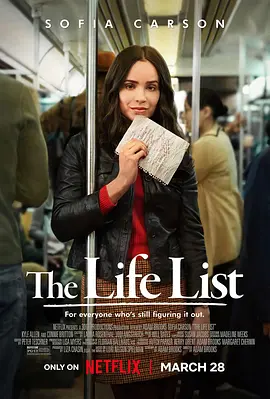
The Life List
Director: Drama, Comedy, Romance
Cast: Sofia Carlson, Kyle Allen, Sebastian de Sousa, Connie Britton, Jose Zuniga, More...
User Rating: 6.7/10 (1601 votes)
At the beginning of the movie, I was attracted by the unique frosted voice of the heroine. I really love her voice, lazy and with a wise tone, very mellow. The group of pregnant women at the beginning of the movie formed a sharp contrast with the heroine. This feeling is very strange. I can't explain it. It vaguely reflects that her boyfriend who loves games is not her true love. The second love came very suddenly. Both of them fell in love at first sight. They lived passionately every day. She thought he was her true love... But they broke up! Not surprisingly, he gave me the impression of a sophisticated man. He was keen on making friends with people who had common topics and the same dimensions. He couldn't accept the low-level jokes of the heroine's friends (actually, I didn't like that joke either). As expected, she and the lawyer ended up together. It was not surprising, not at all. After all, choosing a tie is something that only close couples would do. The movie hinted at the beginning that they would be together. In addition, the heroine always thought that her adoptive father didn't love her. But I don't think so. Just like her biological father said, the first thing the adoptive father did after driving home was to pick up the young girl and spin her around, but she didn't remember it. At the end of the movie, the adoptive father also described this behavior again. Regarding the relationship between the heroine and her mother, to be honest, it is really warm and heartwarming.
Read Full Review